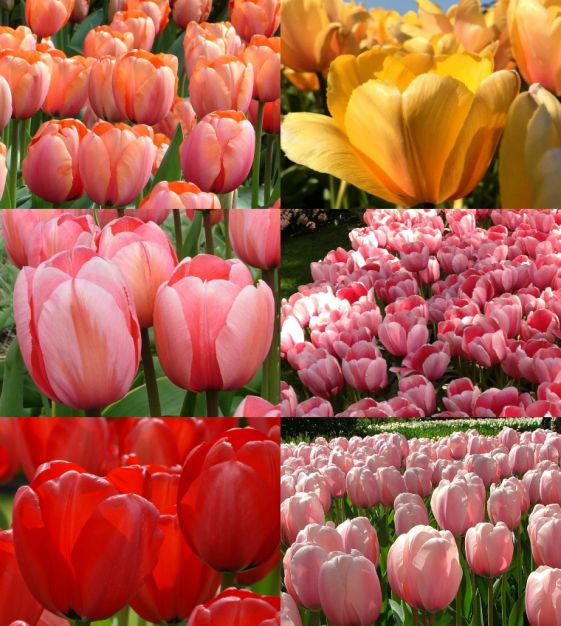-
- Website Specials
- New for 2025!
- Tulips
- Narcissi
- Allium
- Anemone blanda
- Brodiaea
- Camassia
- Chionodoxa
- Corydalis
- Crocus
- Eranthis
- Eremurus
- Erythronium
- Fritillaria
- Galanthus
- Geranium
- Gladiolus
- Hyacinths
- Hyacinthoides
- Ipheion uniflorum
- Dutch Iris
- Rock Garden Iris
- Ixiolirion
- Leucojum Aestivum
- Muscari
- Ornithogalum
- Oxalis
- Puschkinia
- Scilla
- Lilies
- Peonies
- Tender Bulbs
- Anemone Giants
- Tecolote Ranunculus
- Freesias
- Paperwhites
- Amaryllis
The Impression Tulip Grand Collection
This impressive collection is the perfect way to sample the magnificence of each of the Impression Tulips. We know that you will end up adoring each of them, but perhaps a side-by-side comparison will help you decide which one is your very favorite. Until you see them in your own garden, you can not imagine how large and long-lasting the flowers are. Our collection includes 10 each of Tulips Apricot Impression, Blushing Impression, Design Impression, Pink Impression, Red Impression and Salmon Impression, each individually packaged and labeled. Tulip Class: Giant Darwin Hybrid. Bulb size: 12 cm/up. Late April/May. HZ: 3-7. 20" to 22".
Tulips are The Art & Soul of Spring.
Tulip Horticultural Tips
Tulips are The Art & Soul of Spring.
Tulip Horticultural Tips
- Information
Giant Darwin Hybrid Tulips
Giant Darwin Hybrid Tulips were introduced to the United States by John Scheepers, our great uncle, in 1951. Sometimes referred to as “perennial tulips” by others, their huge, vibrant flowers on strong stems are more apt to return for multiple years of blooms than other sorts of Tulips, but that is not a guarantee. They have been known to return for multiple years when planted in a nice sunny spot with good drainage, fertilized regularly, never cut for bouquets and dead-headed once the flower is spent. One must also allow the foliage to thrive in the sunlight unfettered by being tied up or covered up with other plant material until it yellows and dies back naturally. This allows the bulb to benefit for the maximum period of photosynthesis and chlorophyll production to nourish and grow the bulb. Flowering from mid-April into May, these stately tulips are excellent for spectacular garden displays and lovely cut flower arrangements. Top size bulbs: at least 12 cm. Bloom time: Mid-April into May. Plant 6" to 8" deep and 6" apart. Horticultural zones 3-7. Height: 18" to 26" depending on the variety.
Tulips are The Art & Soul of Spring.
Tulip Horticultural Tips
Giant Darwin Hybrid Tulips were introduced to the United States by John Scheepers, our great uncle, in 1951. Sometimes referred to as “perennial tulips” by others, their huge, vibrant flowers on strong stems are more apt to return for multiple years of blooms than other sorts of Tulips, but that is not a guarantee. They have been known to return for multiple years when planted in a nice sunny spot with good drainage, fertilized regularly, never cut for bouquets and dead-headed once the flower is spent. One must also allow the foliage to thrive in the sunlight unfettered by being tied up or covered up with other plant material until it yellows and dies back naturally. This allows the bulb to benefit for the maximum period of photosynthesis and chlorophyll production to nourish and grow the bulb. Flowering from mid-April into May, these stately tulips are excellent for spectacular garden displays and lovely cut flower arrangements. Top size bulbs: at least 12 cm. Bloom time: Mid-April into May. Plant 6" to 8" deep and 6" apart. Horticultural zones 3-7. Height: 18" to 26" depending on the variety.
Tulips are The Art & Soul of Spring.
Tulip Horticultural Tips
Giant Darwin Hybrid Tulips
Giant Darwin Hybrid Tulips were introduced to the United States by John Scheepers, our great uncle, in 1951. Sometimes referred to as “perennial tulips” by others, their huge, vibrant flowers on strong stems are more apt to return for multiple years of blooms than other sorts of Tulips, but that is not a guarantee. They have been known to return for multiple years when planted in a nice sunny spot with good drainage, fertilized regularly, never cut for bouquets and dead-headed once the flower is spent. One must also allow the foliage to thrive in the sunlight unfettered by being tied up or covered up with other plant material until it yellows and dies back naturally. This allows the bulb to benefit for the maximum period of photosynthesis and chlorophyll production to nourish and grow the bulb. Flowering from mid-April into May, these stately tulips are excellent for spectacular garden displays and lovely cut flower arrangements. Top size bulbs: at least 12 cm. Bloom time: Mid-April into May. Plant 6" to 8" deep and 6" apart. Horticultural zones 3-7. Height: 18" to 26" depending on the variety.
Tulips are The Art & Soul of Spring.
Tulip Horticultural Tips
Giant Darwin Hybrid Tulips were introduced to the United States by John Scheepers, our great uncle, in 1951. Sometimes referred to as “perennial tulips” by others, their huge, vibrant flowers on strong stems are more apt to return for multiple years of blooms than other sorts of Tulips, but that is not a guarantee. They have been known to return for multiple years when planted in a nice sunny spot with good drainage, fertilized regularly, never cut for bouquets and dead-headed once the flower is spent. One must also allow the foliage to thrive in the sunlight unfettered by being tied up or covered up with other plant material until it yellows and dies back naturally. This allows the bulb to benefit for the maximum period of photosynthesis and chlorophyll production to nourish and grow the bulb. Flowering from mid-April into May, these stately tulips are excellent for spectacular garden displays and lovely cut flower arrangements. Top size bulbs: at least 12 cm. Bloom time: Mid-April into May. Plant 6" to 8" deep and 6" apart. Horticultural zones 3-7. Height: 18" to 26" depending on the variety.
Tulips are The Art & Soul of Spring.
Tulip Horticultural Tips





